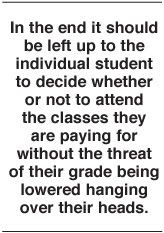Many students receive lower grades than they deserve in classes where absences unfairly affect their overall grade.
The idea that in 15 weeks a student can only be absent twice before their grade in a class goes down an entire letter grade is ludicrous.
Students who do the work and earn an A in a class should not get a B just because they were absent three times.
While many professors choose not to take roll at all, or have less strict attendance policies, many of them subscribe to the rule that for every three missed class periods a student’s final grade goes down. Some also count tardies as absences.
For classes that meet only once a week this may make more sense, but for classes which meet two or three times a week it is a punishment that does not fit the crime.
Taking roll should be used to benefit students who consistently show up and participate in class, not to punish students who may not be able to make it to class for a variety of reasons.
Many college students stretch themselves too thin by taking too many units at a time to try to graduate in less than six or seven years. Many also have jobs outside of school.
The stress and time commitment of going to school full-time while also maintaining a full or part-time job can lead to burn out and many students are sleep deprived and have little or no free time to enjoy college.

Students who are running on empty also often stay up late at night doing homework or studying with the aid of coffee or energy drinks and later crash and end up sleeping through their early morning classes.
Other than being sick or sleeping through class, students may also miss class if they have a conflict with work, if they are doing work for another class, if they have a family emergency, or for any other number of reasons.
If students miss class they may miss information vital to passing the class with a good grade so students who miss a large number of classes usually see this reflected in their grade at the end of the semester even without mandatory attendance policies.
So why punish students further for missing classes by significantly lowering their grade in the course for days they are absent?
Classes with strict attendance policies are often more well-attended than classes which don’t, which ultimately benefits the students who learn better in a classroom than on their own.
However, some classes are taught almost verbatim from the book and students may get more out of the material by going over it on their own rather than in class.
Either way it is ultimately the student’s decision whether or not to go to class and whether they have a “valid” reason for missing class or not, their grade should not suffer simply because they were absent or late.
Since high school is supposed to teach students the fundamentals that they need to know in order to be successful in the working world it makes sense that attendance is mandatory there.
Once students reach college, which is no longer education required by the government, the decision of whether or not to attend class becomes theirs.
Ideally students go to college because they want to and are driven by a love of learning and a yearning for success, but the reality is that many students feel forced into college the same way they were required to go to high school.
One major difference between the two institutions is that students must pay to go to college while a public education in high school is free.
It is also important to keep in mind that college students are adults, and are therefore responsible for making their own decisions.
In the end it should be left up to the individual student to decide whether or not to attend the classes they are paying for without the threat of their grade being lowered hanging over their heads.
If students can be responsible enough to do the work required to excel in a class while missing more than the allowed number of days, why discount their success just because it was outside of the classroom?





